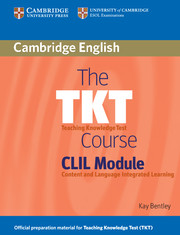Unit 15 - Focus of assessment
Published online by Cambridge University Press: 27 September 2023
Summary
What is the focus of assessment in CLIL?
All teachers are aware of the challenges in carrying out assessment of learners’ progress, but CLIL has its own challenges because it aims to teach both content and language. In many countries, CLIL approaches are quite new and some teachers are unsure of what, how and when to assess. Should it be content, language, or both?
CLIL assessment can focus on areas of subject content, such as answers to maths questions; on areas of language, such as use of conditional forms in hypotheses; or on areas of content and language, such as those used in the description of a process (technical vocabulary, sequencing, present tense verbs). A focus on language is more common in soft CLIL programmes, which are often part of language courses, while hard CLIL programmes focus on content and language or sometimes just content.
CLIL assessment can also focus on communication skills, cognitive skills (learners think about what they learned and also how and why they learnt it), practical skills (e.g. carrying out investigations, doing experiments, measuring, drawing) and learning to learn. To be able to assess CLIL effectively, we need to put learners at the centre of the process and to find out what standards are achievable when they study subject content in a non-native language. We need to be aware of the language levels and the learning needs of our learners in different curricular subjects. It is also important that the learners are aware of what the focus of assessment is.
Key concepts
Before assessing our learners, we need to be clear about why we assess them. Is it to:
find out what learners know about our subject?
find out strengths and areas for improvement in subject content and use of language in order to give learners feedback on these?
find out what motivates our learners?
monitor progress in thinking skills, practical skills and learning?
identify support strategies needed?
encourage learners about their progress in learning content and language?
find out if our planning and teaching of subject content have been effective?
inform colleagues, parents, authorities?
give them a qualification at the end of a course?
Or is it a combination of the above? We need to consider this when we assess.
- Type
- Chapter
- Information
- The TKT Course CLIL Module , pp. 84 - 88Publisher: Cambridge University PressPrint publication year: 2010



